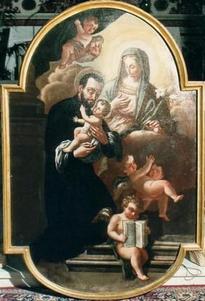 The Mother of God and St. Cajetan
The Mother of God and St. Cajetan From a desire to restore the corrupted discipline of the clergy to the mould of the Apostolic life, he founded a Congregation of Clerks Regular, who should give up all care of earthly things, neither keeping any income, nor begging the needful things of life from the faithful, but living only on such alms as might be given them unasked. For this end, and with the approval of Clement VII, Cajetan himself, together with John Peter Carafa, Archbishop of Chieti (afterwards Pope Paul IV), and two other men of eminent godliness, took solemn vows at the High Altar of St. Peter's Church in the Vatican. When the city of Rome was sacked by the troops, Cajetan was most cruelly ill-used to make him reveal his wealth, which had long before been laid up for him in heaven by the hands of the poor, and he endured with unconquered patience stripes, torture, and imprisonment. He held on bravely in the way of life he had taken up, trusting altogether to the Providence of God, whose unfailing care of him was sometimes attested by miracles.
He was a great advancer of care in the worship of God, of splendour in the house of God, of exactness in the holy ceremonies, and of the often receiving of the most holy Eucharist. The hideous forms and dark convolutions of heresy he more than once unmasked and abolished. He would remain in prayer with abundance of tears as much as eight hours at a time. He was often thrown into trances, and was celebrated for the gift of prophecy. One Christmas night at Rome, when he was praying before the Lord's manger, he was deemed worthy that the Mother of God should lay the Child Jesus in his arms. He sometimes spent the whole night in whipping himself, nor could he ever be persuaded to soften the hardness of his life, but witnessed that he was fain to die in sackcloth and ashes. In the end he fell ill with grief at the offence against God, which the people of Naples committed by rebelling against the establishment of the Inquisition. Refreshed by a vision from heaven, he departed thither. His body lieth at Naples in the Church of St. Paul, where it is held in great reverence. Pope Clement X, finding him to have been illustrious for miracles, both during his life and after his death, enrolled his name among those of the Saints.




